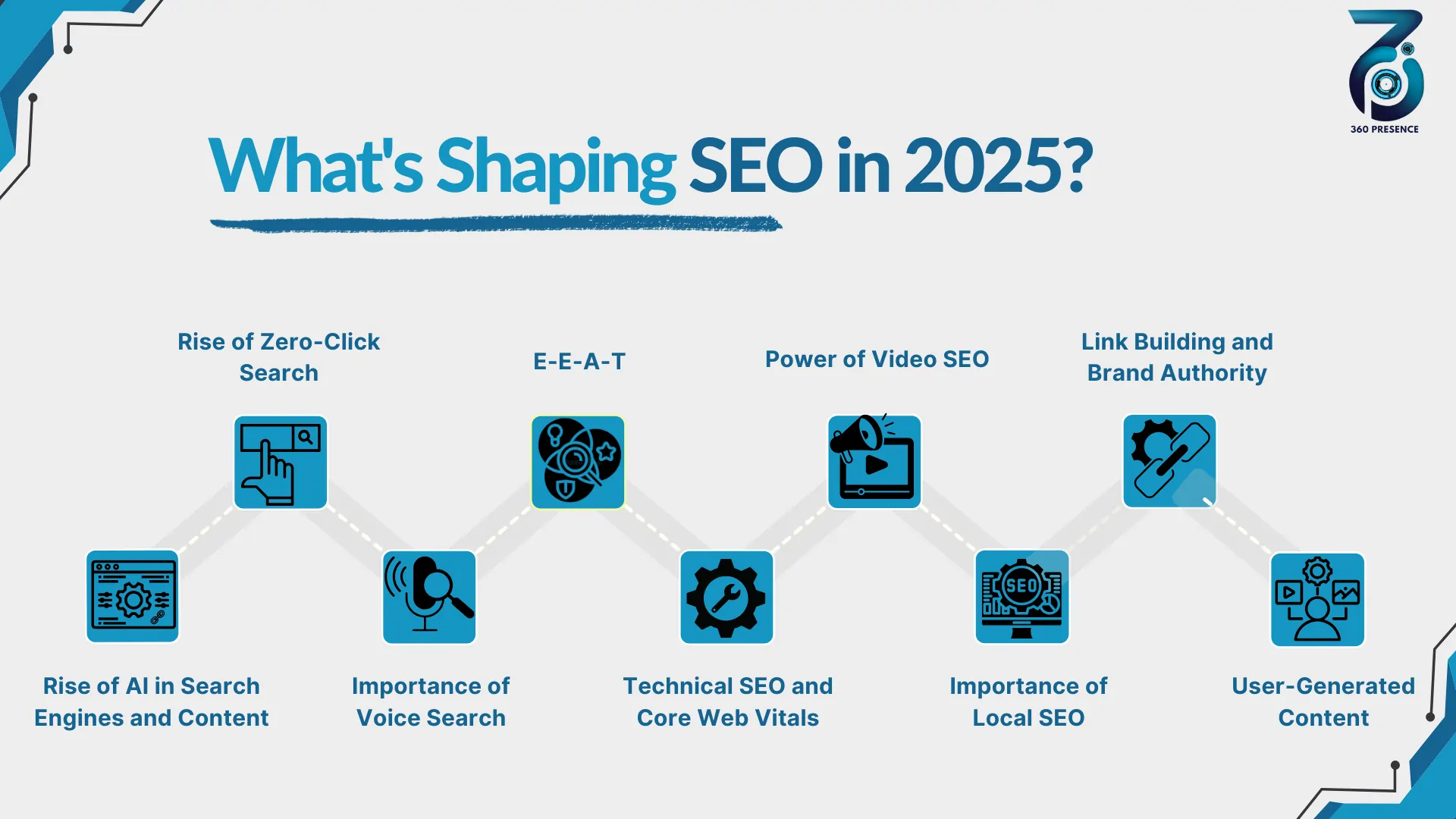SEO Search Engine Optimization: Latest Trends & Updates

Latest SEO Trends and Updates
Welcome to the exciting and ever-evolving world of Search Engine Optimization (SEO)! If you’re just starting to learn how to make your website more visible on search engines like Google, you’ve landed in the right place. This blog post will break down the key SEO trends and updates anticipated for 2025 in a way that’s easy to understand. Staying informed about these shifts is essential for anyone aiming for online success. So, let’s explore what the future holds for SEO!
What's Shaping SEO in 2025?
Think of search engines as enormous digital libraries, where your website is a book. SEO is the art and science of ensuring your book is easily discoverable by those seeking the information it contains. In 2025, several significant forces will shape how these “libraries” organize and present information. These include advancements in Artificial Intelligence (AI), a growing emphasis on providing immediate answers, the increasing popularity of voice search, and the continuous importance of trustworthy, high-quality content. Let’s delve into each of these trends.
1. The Rise of AI in Search Engine and Content
Artificial intelligence is rapidly moving from the realm of science fiction to a core component of how search engines operate. Expect AI to play an even more significant role in 2025, enhancing the ability of search engines to understand user intent and deliver more tailored and precise search results.
How this impacts your strategy:
Smarter Search Outcomes: Search engines like Google are becoming increasingly adept at interpreting the nuances of language and the underlying purpose behind search queries. Consequently, your content needs to genuinely address user needs.
Emergence of AI-Powered SEO Tools: You’ll likely see a rise in AI-driven tools designed to assist with various SEO tasks, such as content creation, keyword analysis, and performance tracking. While these can be valuable aids, remember that human creativity and strategic thinking remain paramount.
Considering AI-Generated Content: As AI capabilities in content creation advance, it’s crucial to understand how search engines evaluate this type of content. The primary focus will likely remain on delivering high-quality, accurate, and genuinely valuable information to the user, regardless of its origin.
Think of it this way: AI is empowering search engines to become more sophisticated readers. Your goal is to produce content that these intelligent readers deem valuable and relevant to their users.
2. The Rise of Zero-Click Search and the Shift Towards Answer Engines
You’ve probably experienced searching for something on Google and finding the answer directly on the search results page, eliminating the need to click on a website. This “zero-click search” phenomenon is expected to continue its upward trajectory. Search engines are increasingly aiming to provide instant solutions to user inquiries.
What this means for your approach:
Optimising for Direct Answers: You’ll need to structure your content in a way that key information can be easily identified and displayed directly in search results. Employing clear headings, bullet points, and concise summaries will be beneficial.
The Value of Featured Snippets: Securing “featured snippets” – those highlighted boxes at the top of search results offering direct answers – will become even more critical.
Providing Comprehensive Value: Even if users don’t always click through to your site for every query, offering thorough and valuable content builds credibility and establishes you as an authority in your field, potentially leading to more direct visits over time.
Imagine this: Search engines are evolving into “answer engines.” Your objective is to provide the most accurate and easily digestible answers to the questions your target audience is asking.
3. The Growing Importance of Voice Search
With the increasing adoption of smart speakers and voice assistants on mobile devices, voice search is becoming a significant way people interact with search engines, particularly for local inquiries and quick information retrieval.
How will this influence your strategy?
Embrace Conversational Language: People speak differently than they type. Voice searches tend to be longer and more conversational. Optimize your content using natural language phrasing.
Focus on Question-Based Queries: Consider the questions your audience might ask verbally. Structure your content to directly address these queries. For instance, instead of optimizing for “best pizza Delhi,” think about “Hey Google, where’s the best pizza place near me in Delhi that’s currently open?”
Local SEO Takes Centre Stage: Voice search often has local intent (“Find the nearest grocery store”). Ensure your local SEO efforts are robust, with accurate information on your Google Business Profile and local listings.
Consider this: When people speak to their devices, they use natural, everyday language. Your content should mirror this conversational style.
4. E-E-A-T: Experience, Expertise, Authoritativeness, and Trustworthiness
Google continues to emphasise E-E-A-T as a vital element in ranking high-quality content. This means the content you produce should demonstrate:
Experience: Does the content reflect real-world experience with the topic?
Expertise: Is the content created by someone with significant knowledge and skill in the subject matter?
Authoritativeness: Is the creator and the website recognised as a reliable source of information on the topic?
Trustworthiness: Is the content accurate, honest, and secure?
How does this shape your content creation?
Highlight Credible Creators: Ensure that your content is developed by individuals with relevant knowledge and credentials. Showcase their expertise.
Prioritise Thorough Research and Accuracy: Support your claims with evidence and ensure your content is factually sound.
Build Website Authority: Enhance the overall authority and reputation of your website through high-quality content, positive user interactions, and earning backlinks from reputable sources.
Maintain Transparency: Identify who is responsible for the content on your site and provide accessible contact information.
Think of E-E-A-T as your website’s credibility score. You earn it by consistently delivering valuable, accurate, and trustworthy information.
5. Technical SEO and Core Web Vitals
While compelling content is essential, a strong technical framework is crucial for SEO success. Technical SEO ensures that search engines can easily access, understand, and index your website. Core Web Vitals are a set of metrics Google uses to evaluate user experience related to loading speed, interactivity, and visual stability.
What does this necessitate for your website?
Prioritise Website Speed: Ensure your website loads quickly. Slow loading times frustrate users and can negatively impact your rankings.
Mobile-First Approach: With a majority of users browsing on mobile devices, your website must be fully responsive and provide a seamless experience across all screen sizes.
Optimise Website Structure and Navigation: A clear and logical website structure helps search engines understand the organisation of your content. Easy navigation helps users find what they need.
Focus on Core Web Vitals: Pay attention to metrics like Largest Contentful Paint (LCP), First Input Delay (FID), and Cumulative Layout Shift (CLS) to ensure a positive user experience.
Efficient JavaScript Implementation: If your website relies heavily on JavaScript, ensure it’s implemented correctly so that search engines can still effectively crawl and index your content.
Think of technical SEO as the underlying infrastructure of your website. A well-optimised infrastructure ensures smooth performance and allows search engines to efficiently access and interpret your content.
6. Power of Video SEO
Video content is incredibly engaging and can effectively capture user attention. It’s also becoming increasingly prominent in search results, especially in the context of zero-click searches.
How to incorporate video into your strategy:
Develop Engaging Video Content: Create videos that are informative, entertaining, or solve specific problems for your audience.
Optimise Video Titles and Descriptions: Use relevant keywords in your video titles and descriptions to help search engines understand the video’s content.
Include Transcripts and Captions: Providing transcripts and captions not only improves accessibility but also gives search engines more text to understand the video’s content.
Utilise Video Schema Markup: Implement schema markup to provide search engines with structured data about your videos, which can enhance their visibility in search results.
Optimise Across Platforms: Optimise your videos not just for Google but also for platforms like YouTube, which is the second-largest search engine.
Consider video as another powerful medium for conveying your message. Optimise it for search just as you would your text-based content.
7. Importance of Local SEO
For businesses with a physical location or those targeting specific geographic areas, local SEO remains a critical component of their online strategy. It helps connect you with customers in your community.
Key considerations for local businesses:
Optimise Your Google Business Profile: Ensure your Google Business Profile is complete, accurate, and up-to-date with essential information such as your business name, address, phone number, website, hours of operation, and customer reviews.
Build Local Citations: List your business on relevant online directories and citation websites.
Conduct Local Keyword Research: Identify keywords that local customers use when searching for your products or services (e.g., “best bakery near me”).
Create Localised Content: Develop content that is relevant to your local audience, such as blog posts about community events or local guides.
Encourage Customer Reviews: Positive customer reviews on your Google Business Profile and other review platforms can significantly improve your local search rankings.
Remember, if you serve a local community, local SEO helps you become the preferred resource for people in your area.
8. Link Building and Brand Authority
While the SEO landscape evolves, some fundamental principles remain constant. Link building – earning high-quality backlinks from other reputable websites – continues to be a significant ranking factor. It signals to search engines that your website is a trusted source of information. Similarly, building brand authority is crucial. When users recognize and trust your brand, they are more likely to click on your search results and engage with your content.
How to approach link building and brand authority:
Develop Linkable Assets: Create high-quality, valuable content that other websites will naturally want to link to. This could include in-depth guides, original research, or compelling infographics.
Engage in Guest Blogging: Write guest posts for other reputable websites within your industry to reach a new audience and earn valuable backlinks.
Cultivate Relationships: Connect with other businesses and influencers in your niche. Collaboration can lead to valuable backlinks and brand mentions.
Focus on Consistent Brand Building: Continuously provide value and engage with your audience to build a strong brand reputation. A strong brand naturally attracts links and organic traffic.
Think of backlinks as endorsements for your website. The more high-quality endorsements you receive, the more trustworthy and authoritative your site appears to search engines.
9. User Experience and User-Generated Content
Search engines like Google are increasingly prioritising user experience (UX) as a ranking signal. A website that is easy to use, provides a positive experience, and keeps users engaged is more likely to rank well. User-generated content (UGC), such as reviews, comments, and forum posts, can also offer valuable insights and build trust.
How to enhance user experience and leverage UGC:
Design an Intuitive Website: Ensure your website is easy to navigate, with a clear structure and logical flow.
Create Engaging Content: Develop content that is not only informative but also captivating and enjoyable to consume.
Optimise for Fast Loading Times: As previously mentioned, website speed is critical for a positive user experience.
Ensure Accessibility: Make your website accessible to users with disabilities.
Encourage User Interaction: Foster a community around your brand by encouraging comments, reviews, and other forms of user-generated content. This can provide fresh perspectives and build trust.
Remember, a satisfied user sends positive signals to search engines about the value of your website. Focus on creating an enjoyable and seamless experience for every visitor.

Navigating the Future of SEO
The SEO landscape is in constant flux, and what works today might evolve tomorrow. The key to long-term success is to remain informed, be adaptable, and consistently prioritize providing genuine value to your audience. By understanding these key trends for 2025 and committing to continuous learning and experimentation, you can navigate the SEO landscape effectively and achieve your online objectives.
To succeed in SEO in 2025 as a beginner, focus on:
- Understanding the increasing role of AI in search results and content creation.
- Optimising for zero-click searches by providing direct and valuable answers.
- Consider voice search and natural language in your content strategy.
- Building E-E-A-T by creating trustworthy and expert-backed content.
- Ensuring a strong technical foundation with fast loading times and mobile-friendliness.
- Exploring the potential of video content and optimising it for search.
- Mastering local SEO if your business has a local presence or target audience.
- Building high-quality backlinks and establishing a strong brand reputation.
- Prioritising user experience and encouraging user-generated content.
Embarking on your SEO journey is an exciting endeavour. By keeping these trends in mind and focusing on creating valuable and user-friendly content, you’ll be well-equipped to improve your website’s visibility and connect with your target audience in 2025 and beyond. Best of luck!
Partner With Naumaan Oman
Search
Recent Posts
Working Together Ideas come to life
No matter how big your company is, as you expand and reach new highs you’ll want an agency to have your back. One with a process
360presence@gmail.com

© 2023 360PRESENCE All rights Reserved
















